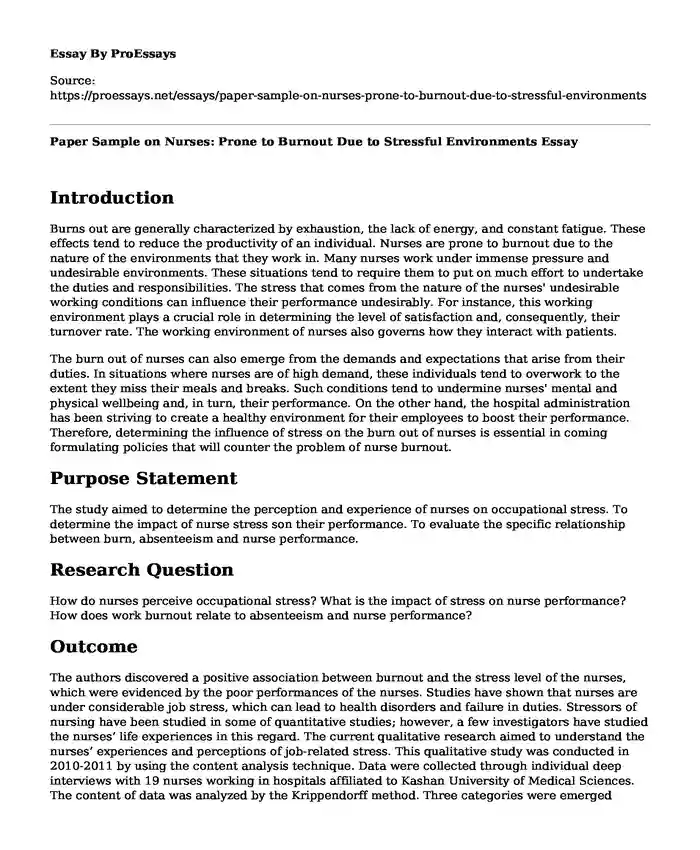Introduction
Burns out are generally characterized by exhaustion, the lack of energy, and constant fatigue. These effects tend to reduce the productivity of an individual. Nurses are prone to burnout due to the nature of the environments that they work in. Many nurses work under immense pressure and undesirable environments. These situations tend to require them to put on much effort to undertake the duties and responsibilities. The stress that comes from the nature of the nurses' undesirable working conditions can influence their performance undesirably. For instance, this working environment plays a crucial role in determining the level of satisfaction and, consequently, their turnover rate. The working environment of nurses also governs how they interact with patients.
The burn out of nurses can also emerge from the demands and expectations that arise from their duties. In situations where nurses are of high demand, these individuals tend to overwork to the extent they miss their meals and breaks. Such conditions tend to undermine nurses' mental and physical wellbeing and, in turn, their performance. On the other hand, the hospital administration has been striving to create a healthy environment for their employees to boost their performance. Therefore, determining the influence of stress on the burn out of nurses is essential in coming formulating policies that will counter the problem of nurse burnout.
Purpose Statement
The study aimed to determine the perception and experience of nurses on occupational stress. To determine the impact of nurse stress son their performance. To evaluate the specific relationship between burn, absenteeism and nurse performance.
Research Question
How do nurses perceive occupational stress? What is the impact of stress on nurse performance? How does work burnout relate to absenteeism and nurse performance?
Outcome
The authors discovered a positive association between burnout and the stress level of the nurses, which were evidenced by the poor performances of the nurses. Studies have shown that nurses are under considerable job stress, which can lead to health disorders and failure in duties. Stressors of nursing have been studied in some of quantitative studies; however, a few investigators have studied the nurses’ life experiences in this regard. The current qualitative research aimed to understand the nurses’ experiences and perceptions of job-related stress. This qualitative study was conducted in 2010-2011 by using the content analysis technique. Data were collected through individual deep interviews with 19 nurses working in hospitals affiliated to Kashan University of Medical Sciences. The content of data was analyzed by the Krippendorff method. Three categories were emerged including ‘nurses’ perception from the job stress, “professional interest”, and “prioritizing career over family life”. The first category included the following subcategories of “being in constantly alarm situation,” “lack of experience”, “dignity and social status”, “lack of proper logistics”, “shortage of nurses”, “Irregularities in the organization,” “directors of nursing performance,” “undesirable relations among colleagues,” and “the patients conditions all have effects on the nurses’ level of professional stress.
Setting
Where did the study take place?
Kashan University of Medical Sciences Elmek Nimer university hospital Random U.S hospitals
Sample 19 participants 125 participants 3147 participants
Key Findings of the Study
Constant work pressure led to burnouts and low social dignity with affected the productivity of the nurses. Increase in job stress led to burnouts that consequently decreased the quality of outcome of the nurses. Burnouts were prevalent among nurses under immense pressure.
Recommendations
Researcher should improve coordination between nurses and healthy relationships between nurses and their managers was key to reduce stress in the work place. Nursing director to include nurses in decision making processes. Hospital should address stress-related factors.
Conclusion
The study participants defined job stress as a condition in which a nurse is under pressure so that the quality of care and the nurses’ personal and family life is interrupted. Being under continuous pressure, low social dignity, and the manner of nurse managers were among the important sources of job stress. Providing appropriate logistics, improving the coordination within hospital subsystems, and improving the managers and nurses relationships may decrease the stressors in nursing profession. The study revealed a positive correlation between nursing stress and burn out and a negative relationship between stress and the nurses' performances. High-stress levels instigated burnout, affecting the nurses' overall performance.
Cite this page
Paper Sample on Nurses: Prone to Burnout Due to Stressful Environments. (2023, Sep 17). Retrieved from https://proessays.net/essays/paper-sample-on-nurses-prone-to-burnout-due-to-stressful-environments
If you are the original author of this essay and no longer wish to have it published on the ProEssays website, please click below to request its removal:
- Essay Example: Extent to Which Obesity is Really a Health Problem
- Gaps in Programming for Couples Essay Example
- Essay Example on Financial Wellness: Achieving Goals With Human Health & Happiness
- Essay Example on Attention Deficit: Understanding Changes in Development
- Julie Thomas: Anxiety, Heart Attack Risk & Life Disruption - Case Study
- Paper Example on A Worn Path: Phoenix Jackson's Hero's Journey Through Obstacles
- Free Report Example on Aphasia: Understanding the Neurolinguistic Disorder







